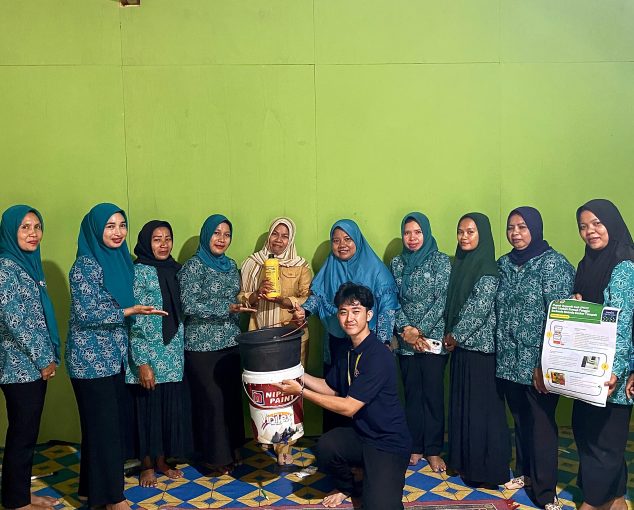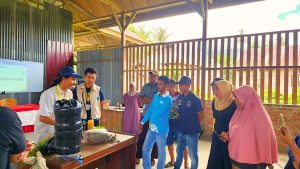
Located 1,420 km from the Special Region of Yogyakarta, a story of student dedication is etched in the land of Southeast Sulawesi. “Mai Te Wuna,” which means ‘come to Muna,’ Muna Regency not only offers beautiful natural scenery but also a community eager for knowledge. The 2024 Community Service and Empowerment Learning Program (KKN-PPM) of Gadjah Mada University was successfully held in Moolo Village and Lanobake Village, Batukara District, Muna Regency, Southeast Sulawesi Province. The KKN-PPM activities were carried out for 50 days, from July 1 to August 20. With the theme “Sustainable Community Empowerment Based on the Optimization of Local Commodities as an Effort to Increase the Transpolitan Mutiara Economy in Muna Regency,” the program involved 28 students from various majors, including Agricultural Microbiology.
This time, two Agricultural Microbiology students had the opportunity to participate in the community empowerment program in Muna Regency, one of whom was Cokorda Keigoputra Pemayun, familiarly called Keigo. Keigo was placed in Moolo Village, where most of the residents are farmers. Various plantation commodities can be found in Moolo Village, such as coconut, banana, and cocoa. The village’s geographical condition, located relatively close to the coast, makes fish a staple food in the area. This background inspired Keigo’s work program during the KKN activities. As a Microbiology student, Keigo developed an interdisciplinary work program in the form of Kombucha Tea production training using local commodities. In addition, to address household waste issues, Keigo innovated by creating liquid organic fertilizer using kitchen waste. Not only as fertilizer, but kitchen waste like fish bones can also be processed into fish bone meal, which can be used as a calcium source. Keigo hopes that the work program he has implemented will benefit many people.

In another village, Lanobake, Muadz Fikri Gunawan, familiarly known as Muadz, also carried out various KKN activities. Lanobake Village has significant natural resource potential. In processing the available natural resources, Muadz conducted training on the production of mycorrhiza-based biofertilizers. This biofertilizer is expected to increase the productivity of crops, especially corn and coconut, which are the main commodities in the village. Additionally, Muadz initiated furikake production training, a Japanese dry seasoning made from a mixture of fish, seaweed, and sesame seeds. This training utilized the abundant marine fish catches in the area. The program not only increased the added value of fish commodities but also introduced food product diversification that could be marketed more widely. On the other hand, Muadz also introduced the cultivation of gama umami grass as cattle feed. Considering the significant cattle population in the village, gama umami grass is expected to become a high-quality feed solution that can support increased livestock production. The cultivation of this grass also aims to reduce farmers’ dependence on feed that must be imported from outside the region, thereby reducing livestock production costs and improving farmers’ welfare.
With these programs, both Keigo and Muadz hope to bring sustainable positive impacts to the community in Muna Regency, whether in agriculture, livestock, or fisheries. This synergy is a strong testament to achieving SDG 2: Zero Hunger, SDG 3: Good Health and Well-Being, SDG 4: Quality Education, and SDG 8: Decent Work and Economic Growth.
Authors: Cokorda Keigoputra Pemayun and Muadz Fikri Gunawan
